
Virginia Tech’s Potomac Yard campus has hit a snag and won’t open until spring 2025.
Project delays have become a local tradition around Potomac Yard. The school said the new Virginia Tech Innovation Campus will open in 2025 rather than later this year, as was planned when the project broke ground in 2021.
A release from Virginia Tech said graduate students who had been planning to attend the school this fall will instead continue attending classes at Virginia Tech’s facility in Falls Church. The deadline for fall 2024 admission is March 1.
“Our vision remains unchanged. We are building a community perfectly positioned to connect talented students with Northern Virginia’s growing tech ecosystem,” Lance Collins, vice president and executive director of the Innovation Campus, said in the release.
The school said, like the RiverRenew project, the Innovation Campus’s delays were caused by supply chain issues.
According to the release:
Virginia Tech broke ground on the Innovation Campus in September 2021 with plans to open this August. While the building’s opening has been delayed to the spring 2025 semester, enrollment and programming in the region continues to prosper. Innovation Campus students have attended classes in Falls Church since fall 2020.
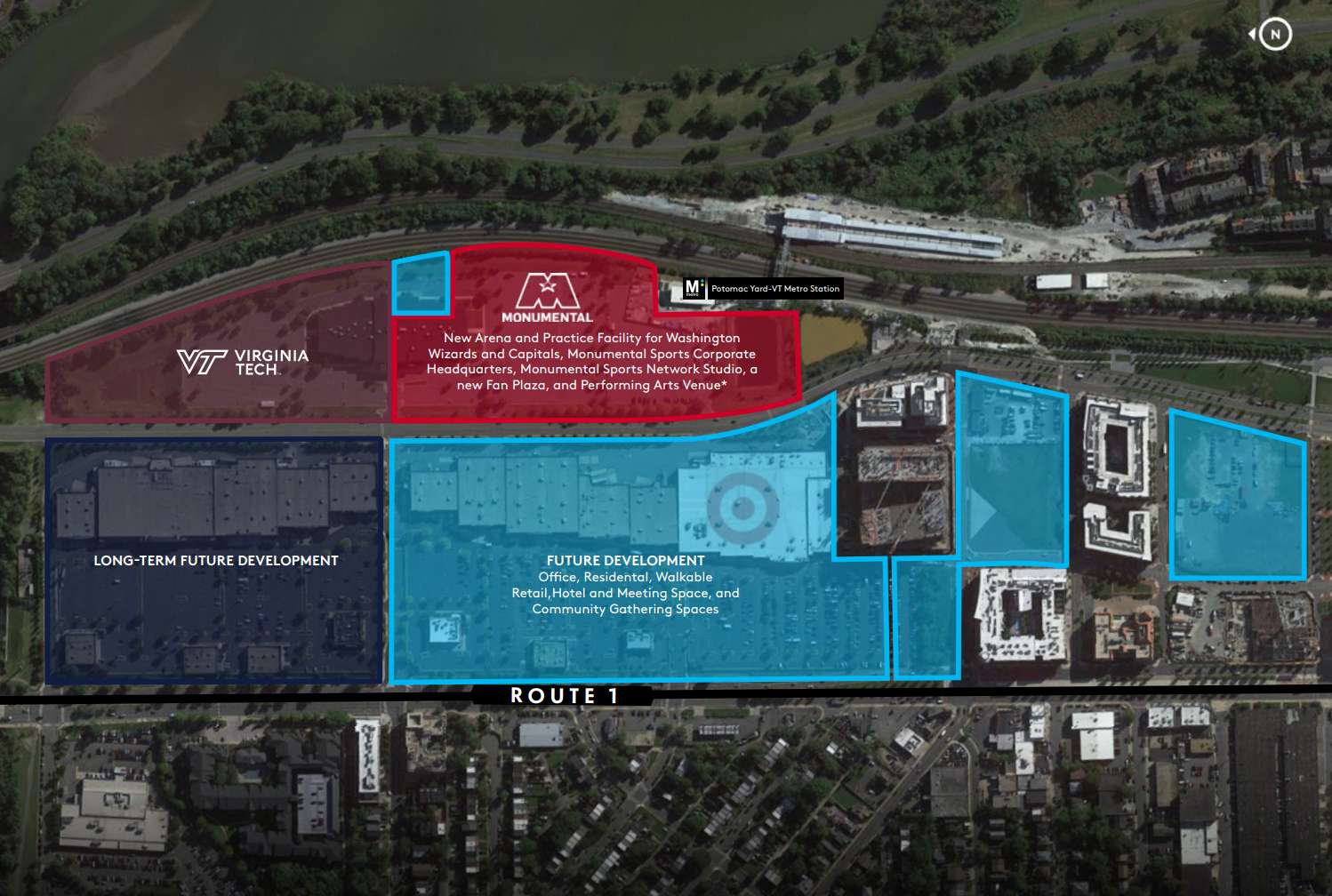
Among all the hubbub about the Potomac Yard arena, there’s been one looming question: how would people travel to and from the new facility?
Transportation has been the key item of concern for both public critics of the project and many civic leaders. While Mayor Justin Wilson said the development will minimize parking to reduce the amount of people taking cars to the site, Metro General Manager Randy Clarke said the newly built Metro cannot handle the levels of arena traffic proposed in this development.
At a Town Hall hosted by the Del Ray Citizens’ Association (DRCA), city leaders spoke to both lingering questions and potential solutions being considered for the Potomac Yard arena’s transportation problems.
Stephanie Landrum, President and CEO of the Alexandria Economic Development Partnership, said the city is working with Kimley Horn to create a transportation plan addressing:
- How do we manage traffic during games and events, different from people coming to and from office or house?
- How do we protect neighborhoods immediately adjacent where people will be traveling through?
- How do we improve Route 1 multimodal improvements already in place with bus rapid transit?
- How do we increase access to transit?
Landrum said the city is also looking into the viability of adding water taxi connectivity to Four Mile Run — though USGS data shows Four Mile Run is typically only around four feet deep.
“We’re looking at bigger ideas, like adding water taxi connectivity on Four Mile Run and how to best connect VRE and Amtrak to our Metro system,” Landrum said.
Katie Waynick, DRCA President, said the water taxi is an interesting consideration.
“Thanks for throwing out the water taxi,” Waynick said. “That was really exciting to see, [it’s] Gondola 2.0. It’s exciting to see different versions of transportation being looked at.”
State Sen. Adam Ebbin said that funding for Metro is a prerequisite for any discussion of the new Potomac Yard arena. Ebbin said he would be examining the transportation plans carefully before making a decision on whether or not to support the arena in the General Assembly.
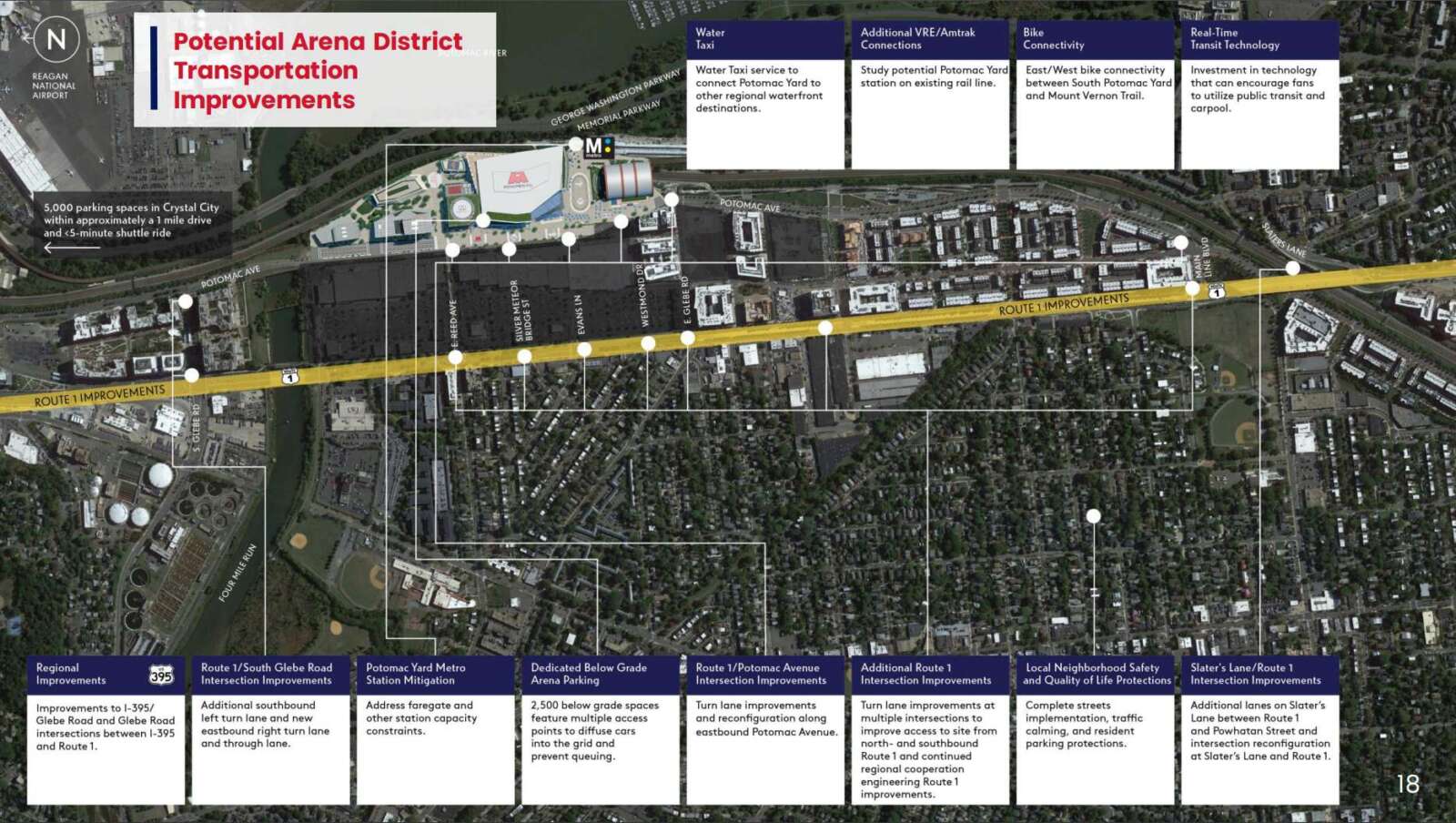
A map of the area in the slide show includes potential transportation improvements being considered along Route 1, including:
- Added turn lanes at multiple intersections to improve site access
- Additional lanes on Slater’s Lane between Route 1 and Powhatan Street, with an intersection reconfiguration at Slater’s Lane and Route 1
- Complete streets implementation, traffic calming, and resident parking protections in nearby neighborhoods
Earlier today, the City of Alexandria announced a full public engagement schedule to run through the end of March, with a meeting specifically on transportation concerns and traffic management on Thursday, Feb. 1.
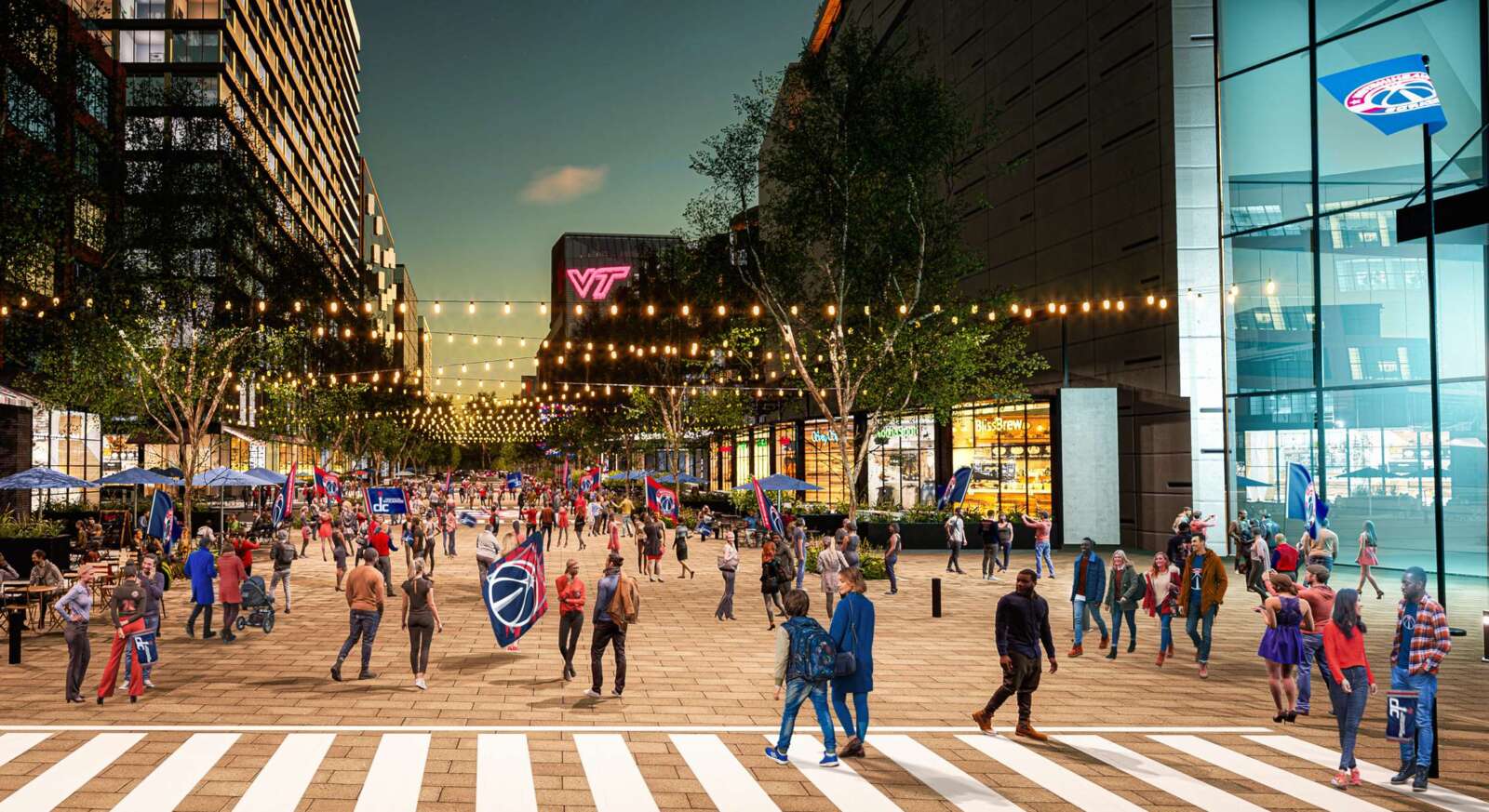
I have bad news for anyone else tired of reading about the Potomac Yard arena: the city announced a three-month schedule of public engagement for the project.
The schedule includes community engagement events, listening sessions, project briefings, site tours and more.
According to the city release:
The City and all partners involved in the Potomac Yard Development Project are committed to listening to and understanding the needs and concerns of the community. Project partners will participate alongside the City throughout this process with the shared goal of bringing to life a collective vision for Potomac Yard and creating exceptional experiences and regional economic growth for decades to come.
We are at the beginning of our public process and eager to listen to and engage with Alexandria and surrounding communities. We invite Alexandria residents, business owners, and those seeking more information and engagement to sign up here.
The city said biweekly public updates will be released on every other Tuesday until March 26 and continuing as-needed after.
The city will also host weekly virtual listening sessions on various topics. According to the release:
Weekly Virtual Listening Series | Starting Thursday, January 18, the City of Alexandria will hold weekly virtual listening sessions on Thursday nights from 7-8 p.m., covering topics, including:
- Financial proposal and economic impact: January 18, 2024
- Schools, housing and other community benefits: January 25, 2024
- Transportation and traffic management: February 1, 2024
- Small business and economic opportunity: February 8, 2024
A town hall with a short presentation is scheduled for Saturday, Jan. 27, at 9:30 a.m.
The release said the city will also host pop-up events, site tours, and meetings with civic and business organizations over the next few weeks and months.
In other Potomac Yard arena news: the plans have already gotten some pushback from local residents and Washingtonians, while the city-funded Alexandria Economic Development Partnership has hired lobbyists to advocate for the project at the general assembly.

The impact that the proposed Washington Wizards/Capitals arena at Potomac Yard will have on local businesses will be discussed in a virtual town hall meeting this week.
Stephanie Landrum, CEO of the Alexandria Economic Development Partnership (AEDP), will speak about the ramifications in a Zoom meeting at noon on Thursday (Jan. 21).
Reception of the news that the multi-billion dollar arena and entertainment district is coming to Potomac Yard has been tepid at best. While an AEDP report states that the development will result in 30,000 new jobs, the city is contending with a number of challenges before the deal can be sealed.
Last week, a group of residents from the Coalition to Stop the Arena at Potomac Yard rallied in protest outside the Potomac Yard Metro station — next door to the proposed development. Concerns ranged from the project’s transportation and financial impacts to parking and quality of life.
“An entertainment district is projected to generate roughly 2.5 times the economic output of what would otherwise be built based on current development plans,” according to an AEDP impact analysis.
Metro General Manager Randy Clarke also said that the newly opened Potomac Yard Metro station can’t handle arena-size crowds and will need an upgrade. In an effort to encourage alternative transportation to events at the proposed district, Mayor Justin Wilson says there will be minimal parking at the completed site, prompting some concern that neighboring communities will be affected by spillover parking.
Landrum recently said that the fate of the Target store at 3101 Richmond Highway in Potomac Yard is undetermined, but that it is one of the most frequent questions she gets regarding the development.
A group of Alexandrians and activists from the neighboring suburb — Washington D.C. — rallied outside of the Potomac Yard Metro station this afternoon, protesting the proposal to bring the Washington Capitals and Wizards to a new arena on the site.
The Coalition to Stop the Arena at Potomac Yard held the rally with around 20 protestors and half as many local reporters.
“The idea that it’s an arena or nothing, that’s not true,” said former Vice Mayor Andrew Macdonald. “We don’t need an arena to thrive.”
Concerns from residents range from the project’s transportation impact — Metro GM Randy Clarke said the nearby Metro station is insufficient to handle the transit demands of the site — to uncertainty about the financial benefits.
“The transportation concerns are insurmountable,” said Shannon Curtis, a nearby resident and part of the Coalition. “Forcing people into public transit is laudable, but the reality is most people will drive here… It will create a traffic boondoggle.”
The Alexandria Economic Development Partnership (AEDP) released a summary of a report commissioned by HR&A advisors describing the economic benefits of the project, but AEDP did not respond to questions about when the full report would be made public. From what was released, some said there is uncertainty about the way some of the findings are reported and the validity of a study commissioned by AEDP.
“Local officials are reminding me of anti-vaxxers,” Curtis said. “They’re relying on one hired gun they paid for answers they want to hear. There’s no transparency.”
“This is a bad financial deal,” Macdonald said. “It’s bad for the city. It’s bad for Virginia.”
In December, Mayor Justin Wilson said the financing structure would have three sources: the city and the state taking portions of tax revenue coming from the development to pay off the loans used for construction and private funding from Ted Leonsis.
Dan Heng, a local resident, noted that the city and state will be paying off the stadium for 40 years, which means the city and state will be on the hook for paying for the stadium even if Leonsis decides to leave in 10 or 20 years.
Others said they were concerned about crime created by the new arena.
“I’m concerned about more crime,” said local resident Barbara Haley. “Nobody is talking about plans to mitigate crime. I would like to see a plan, but they don’t have one. Nobody is talking about it.”
The project has also created an uproar across the Potomac River. Ronald Moten, an activist in Washington D.C., said the project won’t benefit Potomac Yard more than other development would, but will rip the economic engine out of Chinatown.
“Everything that glitters is not gold,” Moten said. “The owner came to D.C., the city spent $65 million [on the arena] to spark growth, and then he left my city hanging.”
Moten said the Chinatown area has the transit access and infrastructure, as well as regional parking, that Potomac Yard lacks.
Moten also pointed back to the departure of Capitals Head Coach Barry Trotz as a telling example of deals with Leonsis.
“This is greed,” Moten said. “This is the owner who has the Capitals, whose head coach asked for a raise after winning the Stanley Cup, and they fired him. This is who you’re dealing with.”
Though it might not be at the same scale as other concerns, Capitals Fan Club member Howard Marks said he was concerned ticket prices would go up — though AEDP Chair Stephanie Landrum said at the announcement that ticket prices may actually decrease with the move due to different taxes in Virginia.
“There’s a surcharge tax on tickets, concessions, and parking to pay for these bonds,” Marks said. “Reveal to fans how much this will cost in fares.”
Macdonald said the looming fight is in the Virginia General Assembly. Despite bipartisan support from local and state leaders at the Potomac Yard arena announcement, delegates and state senators in both parties have expressed doubts about the project.
“We call upon all of the General Assembly to not approve this project,” Macdonald said.
PR firm Jasper Advisors reached out to ALXnow with a joint statement from Monumental Sports & Entertainment, the Commonwealth of Virginia, the City of Alexandria, and JBG SMITH, saying:
We are at the beginning of a process to share the vision to build a world-class Entertainment District and engage with the Alexandria community and listen to their feedback. Alexandria residents are rightfully proud of their city and can be assured we will listen to the needs and concerns of the community. Monumental Sports & Entertainment, the Commonwealth of Virginia, the City of Alexandria, and JBG SMITH look forward to partnering with community members in Alexandria and fans across the Greater Washington Area to bring to life a collective vision for Potomac Yard and create exceptional experiences and regional economic growth for decades to come.
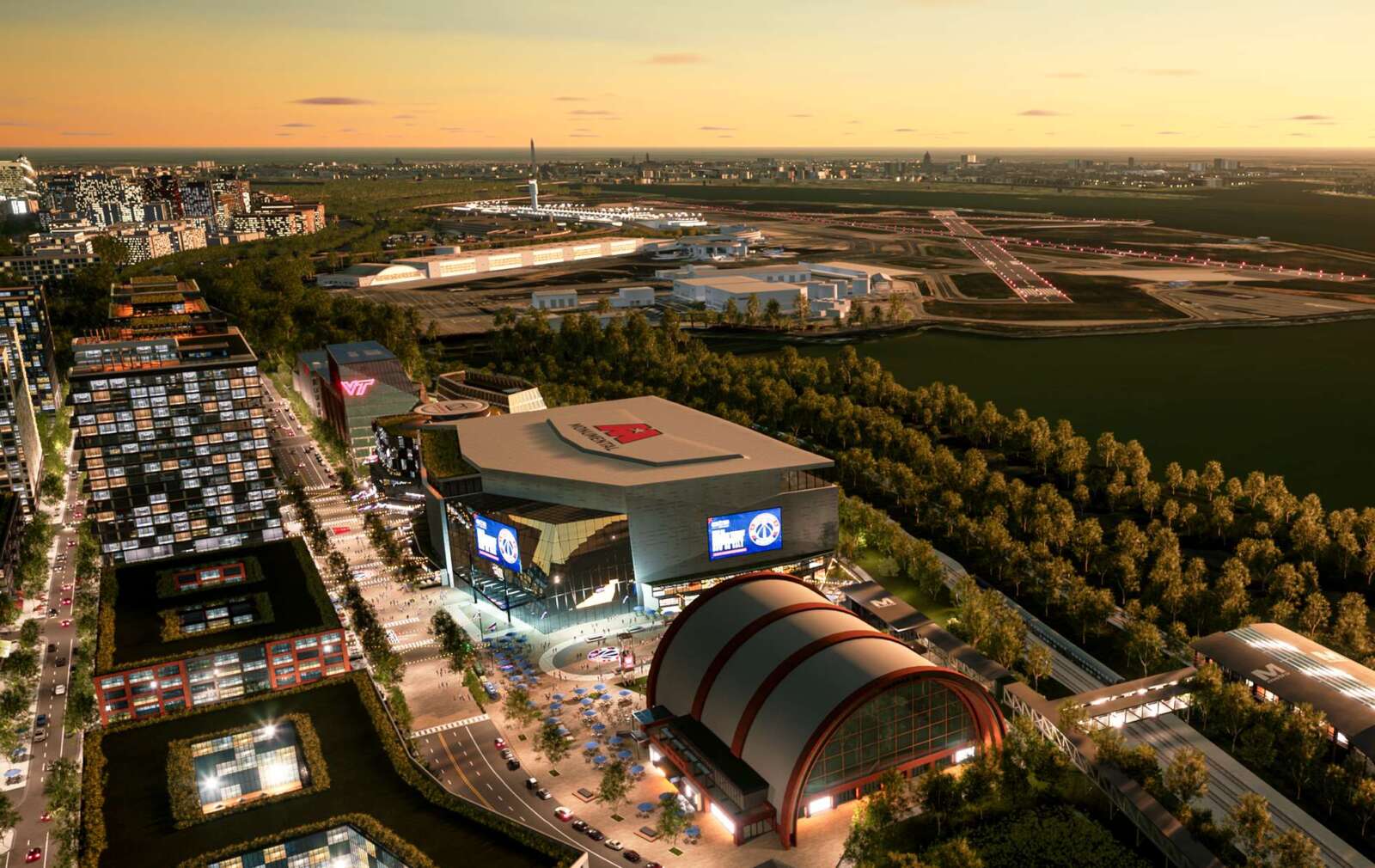
(Updated 2:30 p.m.) A group called the Coalition to Stop the Arena at Potomac Yard is holding a rally tomorrow near the site of the proposed arena.
For those just now waking up from a month-long coma: Washington Capitals and Wizards owner Ted Leonsis announced, along with city leaders and Virginia Governor Glenn Youngkin, that the teams would be moving to a new arena in Potomac Yard — pending a series of approvals from various levels of government.
City, state and federal representatives said at the announcement that the announcement would be a significant economic boon to the city and accelerate development plans for Potomac Yard.
Public backlash was swift, with protestors gathering outside of the tent where the announcement was being held and jeering at officials inside.
The Coalition to Stop the Arena at Potomac Yard was formed, hot on the heels of another coalition protesting against zoning changes. Former Vice Mayor Andrew Macdonald, chair of the Environmental Council of Alexandria, said the Coalition to Stop the Arena at Potomac Yard is holding its first event on Thursday, Jan. 4, at 11 a.m. just north of the Potomac Yard south station.
“The Coalition to Stop the Arena at Potomac Yard will be holding its first media event at Potomac Yard to explain why we oppose the plan to build a sports arena in Alexandria,” Macdonald wrote. “We will answer questions about the project’s impacts on the community and taxpayers in Alexandria and Virginia.”
Macdonald led the charge, along with former Natural Resource Manager Rod Simmons, against the city’s Taylor Run Stream Restoration plans in 2021.
Last month, the Alexandria Economic Development Partnership (AEDP) released a summary of an economic report from consultant HR&A advisors. The summary noted that the district would generate 30,000 jobs and nearly triple the economic output compared to what was currently planned for the Potomac Yard development.
The summary faced some criticism, though, from methodology to AEDP releasing a ‘summary’ rather than the full report.

The Alexandria Economic Development Partnership (AEDP) released a summary of an economic impact report for the new Potomac Yard arena, but so far, much of the online reception has been skeptical.
AEDP hired HR&A Advisors to write an economic impact report in June. The full report has not been released, but AEDP released a summary of the report last week.
According to the summary:
Key takeaways from this analysis are provided here, with additional detail on methodology and findings provided in the sections below.
- Development of an entertainment district would generate approximately 30,000 permanent jobs for the Commonwealth of Virginia.
- An entertainment district is projected to generate roughly 2.5 times the economic output of what would otherwise be built based on current development plans.
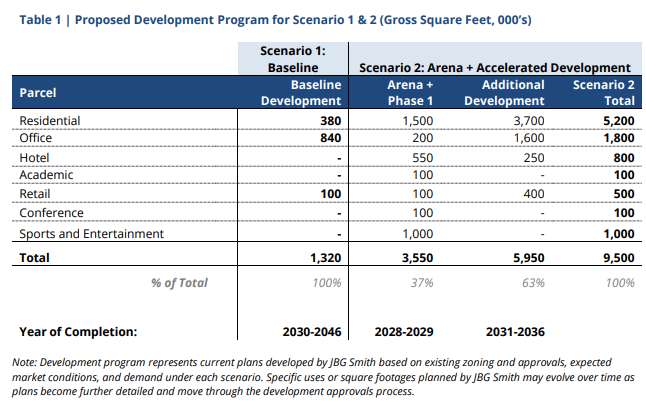
Terry Clower, professor of public policy in the Schar School of Policy and Government at George Mason University, told ALXnow the project would likely be a “spectacular amenity for the City of Alexandria,” though Clower said it remains to be seen whether the new development will bring new economic investment to the region or just cannibalize development from the Gallery Place arena.
However, other Alexandrians are skeptical about the economic benefits of the project. Several concerns were raised about the summary, both in the comments on this site and across social media.
The summary said HR&A Advisors used the IMPLAN input-output economic impact modeling tool to analyze the project’s economic impacts.
IMPLAN is frequently used in economic impact studies, though it’s also come under fire in the past as a model that only shows benefits to a potential project rather than the total economic impacts.
Another issue raised multiple times was that, while the study was independent, there are accusations of bias due to the study being paid for by AEDP. One of AEDP’s board members, AJ Jackson, is executive vice president of JBG Smith, the real estate investment trust that would develop the site.
Of note: AEDP has also not released the full analysis, only a summary of information from the report, and no date has been set for a release of the full report.
Again, reports commissioned by people who want to spend tax dollars on a stadium are not "studies," they are PR documents. Actual economic studies have demonstrated time and again that stadiums do not spur economic development are bad public investments. There are no exceptions. https://t.co/C0IXxq6gO0 pic.twitter.com/ceMrjJpNID
— J.C. Bradbury (@jc_bradbury) December 26, 2023
We’re working on it now, but would like to take some time away for everyone to enjoy their holidays, including you and your family. We’ll expect to be in touch after the holidays.
We’d also like the full impact analysis to be published ASAP.
— S (@sc7128) December 24, 2023
Yes —That's essentially the response that several people have received from him when they asked that question. The teams should stay in DC and we should look at other ways to redevelop PY.https://t.co/cLWs6KlADo
— Environmental Council of Alexandria Virginia (ECA) (@EcaAlexandria) December 25, 2023
The economic arguments over the Potomac Yard arena are, in part, tied in with broader questions about the impact of sports stadiums on local economies.
While a portion of the funding will come from Ted Leonsis — a $400 million downpayment — the City of Alexandria and the Commonwealth of Virginia are funding the project through the same tax mechanism that paid for the Potomac Yard Metro station. The city and the state are taking out debt on the project to be paid off in revenue from the project.
Stadiums are almost always bad investments for cities, with some reports showing stadiums don’t bring in the jobs or tourist revenue claimed.
“There are a lot of bad stadium deals around the country,” Mayor Justin Wilson said. “That’s why, when we went into this discussion, we had to have private money in this… A public-private partnership should not be entirely public. There are stadium deals around the country, even in this region, that have been entirely public. We, as we went through this process, tried to ensure that we learned the lessons of those failed deals.”
The Potomac Yard arena faces challenges in more than just economic analysis though: one of the biggest questions is how to handle transportation demands at the arena.
Wilson said the city would deliberately keeping parking levels low at the site to discourage car traffic, but Wilson and Metro General Manager Randy Clarke both said the Potomac Yard Metro station doesn’t have the capacity to handle sports arena traffic.

(Updated 12/27) An economic impact report released last Friday said the new Potomac Yard arena would create 30,000 jobs and more than double the economic output of previous development plans.
The report came from HR&A Advisors, a consultant hired by the Alexandria Economic Development Partnership AEDP in June as a technical advisor.
The memo to AEDP from HR&A Advisors notes that the findings are based on Monumental Sports & Entertainment operations information shared by AEDP that shows statistics from arena and performing arts venue events.
The report looks at the economic impacts of the development, from construction impacts to economic output and tax revenue.
According to the report:
Key takeaways from this analysis are provided here, with additional detail on
methodology and findings provided in in the sections below.
- Development of an entertainment district would generate approximately 30,000 permanent jobs
for the Commonwealth of Virginia.- An entertainment district is projected to generate roughly 2.5 times the economic output of
what would otherwise be built based on current development plans.

The permanent annual economic output of Potomac Yard sans arena vs Potomac Yard with the arena, according to the report, is $3.5 billion vs $8 billion. Over the next 30 years, the report says the ongoing economic output is estimated at $93.8 billion with the arena as compared to $36 billion without the arena.
Some of that revenue to the city and the Commonwealth would go to paying off debt borrowed to build the arena. According to Mayor Justin Wilson:
The debt borrowed by this public entity will be paid by three streams of money.
First: a private stream. Ted Leonsis will pay, first of all, a $400 million downpayment and a rent payment. That rent payment will be used to pay off that debt.
Second: the city will take a portion of the new tax revenue that comes from this development and we will use it to pay off a portion of this debt borrowed by that authority.
Third: the Commonwealth will take a portion of its tax revenue coming off this use and they will use it to pay off the loans used to construct it.
This is exactly the way we funded the Potomac Yard metro. We funded it using the tax increment of development that happened in Potomac Yard.
The summary is available online.
Whether the arena goes forward remains to be seen, Alexandrians were quick to raise concerns about the transportation impact and local leaders followed suit in the days after the announcement.
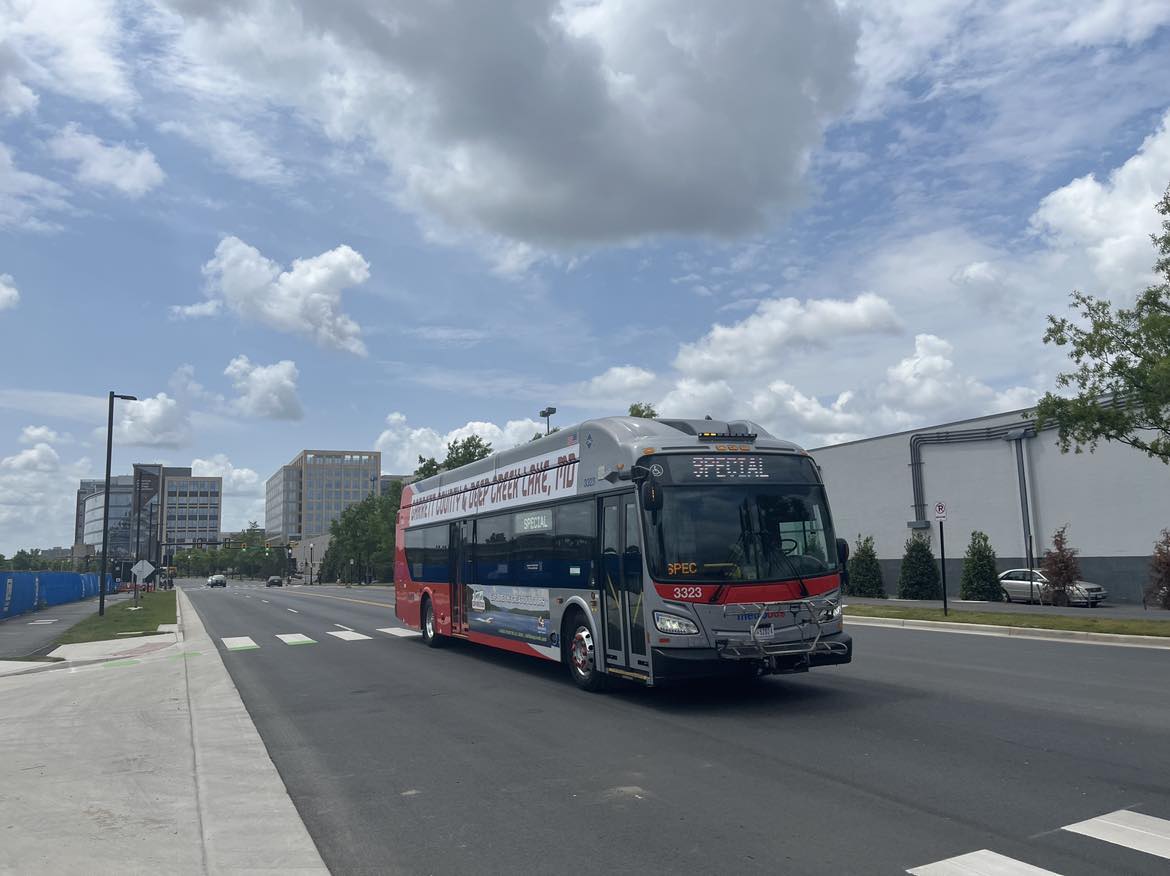
If Metrobus service is cut back, as WMATA has threatened, several Alexandria lines could be on the chopping block.
General Manager Randy Clarke warned that bus service cuts and job cuts are imminent if the transit agency doesn’t close its $750 million budget gap, adding that he said it’s time for a regional tax to permanently fund WMATA.
Under the drastic cuts proposed by Clarke, all stations would close at 10 p.m., train frequency would drop, and ten stations would be shut down. Among the stations being considered for a shutdown is Alexandria’s new Potomac Yard station, which is also the centerpiece of transit plans for the new Monumental arena.
Clarke also released a list of bus routes, nearly half the Metrobus lines, that would be cut or have reduced service. Many of those routes in Alexandria go through the West End to connect to the Pentagon
The Metrobus lines in Alexandria that would be cut include:
- Route 8W runs through the West End to the Pentagon
- Routes 17B, 17G, 17K and 17M, also running through West End to the Pentagon
- Routes 18G, 18J, 18P, which go through Springfield, up into Alexandria’s West End, and finish at the Pentagon
- Route 21C from Landmark to the Pentagon
- Route 22A through Parkfairfax and the Bradlee Shopping Center up to the Pentagon
- Route 22F from Northern Virginia Community College up to the Pentagon
- Route 28F from S. George Mason Drive up to the Pentagon
- Route 29G from Annandale, through the West End, up to the Pentagon
- Route MW1 from the Braddock Road Metro station to Pentagon City
- Route NH2 from the King Street Metro station to National Harbor
Other routes in Alexandria could see reduced service, including:
- Route 7A from the Van Dorn Metro station up to the Pentagon Metro station
- Route 28A from the King Street Metro station to Tysons
- Route 29K from the King Street Metro station to George Mason University
- Route 29N from the King Street Metro station to the City of Fairfax
State Sen. Adam Ebbin previously said that Metro funding is a ‘prerequisite‘ for Potomac Yard plans and Gov. Glenn Youngkin’s budget proposal includes the possibility for Metro to receive increased local funding.
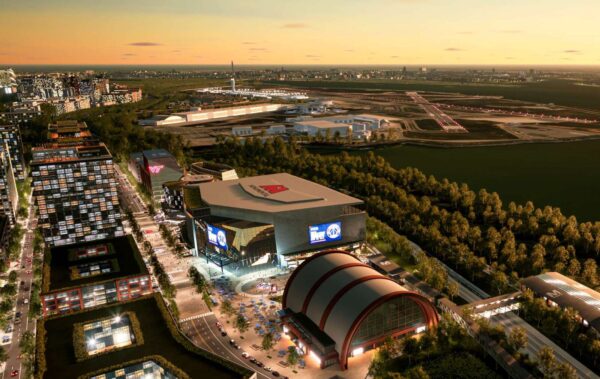
A new Change.org petition opposing the new Washington Wizards/Capitals arena at Potomac Yard is slowly gaining steam.
Last week, Ted Leonsis, the CEO of Monumental Sports & Entertainment and owner of both teams, announced the move alongside Virginia Gov. Glenn Youngkin and Alexandria Mayor Justin Wilson. The $2 billion proposal would mean a new entertainment district for the area, which critics say will worsen traffic and decrease property values.
The petition, posted “on behalf of residents in the Alexandria and NoVA region,” launched on Dec. 13 and has garnered more than 300 signatures. It says that Virginia lawmakers are finalizing a deal that “will bring a new, disruptive entertainment and sports arena to Potomac Yard.”
“We call on our state and local officials to listen to their constituents and stop this initiative from ruining our communities,” the petition states. “Bringing this enormous commercial facility to the area will completely undermine what Alexandria is and the value it brings to residents, homeowners, families, and local businesses. Everything that makes this area great will go away.”
The petition says that the development will:
- Greatly worsen traffic
- Deteriorate integrity of historic communities
- Disrupt lives of families & children
- Decrease property values
- Increase crime
- Diminish small neighborhood dynamic
- Negatively impact natural environment
- Bring noise pollution
- Put taxpayer money into billionaire pockets
A recent ALXnow poll on the subject garnered more than 2,500 votes, with 46% voting that the new arena plans are terrible, 31% voting that it’s a great idea and 23% reserving judgement until more plan details are released.
The development has raised serious transportation concerns, recently from Metro General Manager Randy Clark, who said that the nearby Potomac Yard Metro station can’t handle arena-size crowds.

